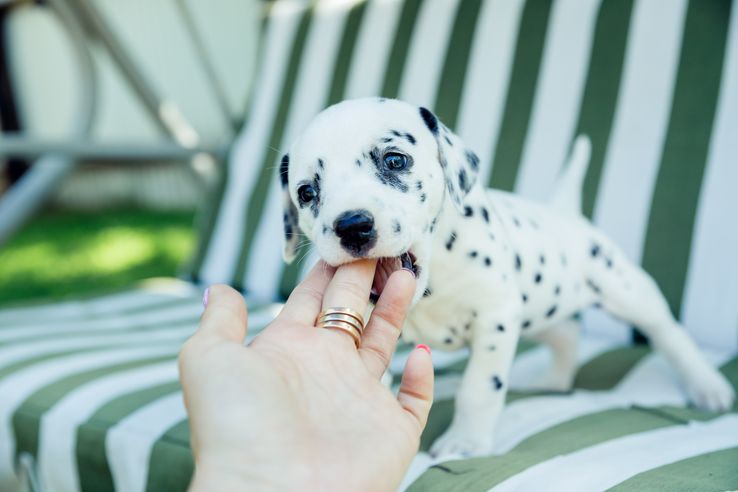How to Handle Puppy Biting: 6 Tips to Easily Manage Your Puppy’s Playful Nips

Puppy biting—it’s a phase every new dog parent faces. While it’s completely normal, it can also be pretty frustrating. But don’t worry, you’re not alone, and this phase won’t last forever—especially if you tackle it early on! Here’s how to manage it and keep your sanity (and skin!) intact.
1. Redirect That Energy
Puppies explore the world with their mouths. Often, their natural curiosity is confused for puppy aggression. When your puppy starts to bite, redirect them to a chew toy instead. If your puppy is biting your clothing it can help to pull it taught to avoid it being mistaken for a fun toy.
Is your puppy always attached to your furry slippers?
Avoid wearing them whilst your puppy goes through this normal and appropriate developmental phase. It is a simple and temporary solution.
2. Provide Chews
During teething, puppies go from 28 teeth to 42 teeth!.
Understandably, this can be very painful and chewing is an important part of the teething process that can help alleviate the pain associated with teething.
Make sure you have plenty of different toys and safe chews on hand to keep your puppy interested.
This teaches your pup what’s okay to chew on (and what isn’t) without scolding or frustration.
3. Reinforce Good Behaviour
Start early and be consistent.
Positive reinforcement is key to minimising biting. Reward your pup with treats, praise, or a favourite toy when your puppy offers other calm behaviours that don’t involve biting.
What gets rewarded gets repeated!
4. Establish a Sleep Routine
Just like we can get cranky when tired, so can puppies.
For this reason, a tired puppy is more likely to be more nippy.
Puppies need around 18-20 hours of sleep per day, so setting a routine is key. Ensure your puppy has a calm area where they can sleep without being disturbed.
Top tip: A sleepy puppy can often look like an energetic puppy, don’t be fooled!
5. Set your puppy up for success
There are often times of day where your puppy will be more likely to bite.
Keep a diary to establish a pattern. Once you have this knowledge you can be proactive and prepare accordingly.
Always have a puppy hanging off your trousers as you try to prepare breakfast?
Set your puppy up with a chew or enrichment toy before the biting begins. Your puppy will be busy and you can make breakfast in peace!
6. Give your puppy space
Sometimes we simply cuddle and pet our puppies too much (who can resist!).
To check if your puppy actually wants you to pet them, try this: stroke your puppy for a few seconds, then pause and move your hand away.
Does your puppy move closer in an attempt to get you to pet them more?
Do they move away?
Or do they stay close but not initiate any further contact?
By reading these signs and adapting our behaviour accordingly, your puppy will no longer need to nip and bite as a way to ask for space.
Hanna Ascough | Your local puppy dog trainer in Richmond
P.S. Dealing with puppy biting can be tough, but you don’t have to do it alone. If you’re looking for practical advice tailored to your situation, get in touch. We’ll work together to turn those frustrating nibbles into calm, gentle play!
Enquire here: Wonderpups Bespoke Puppy Training